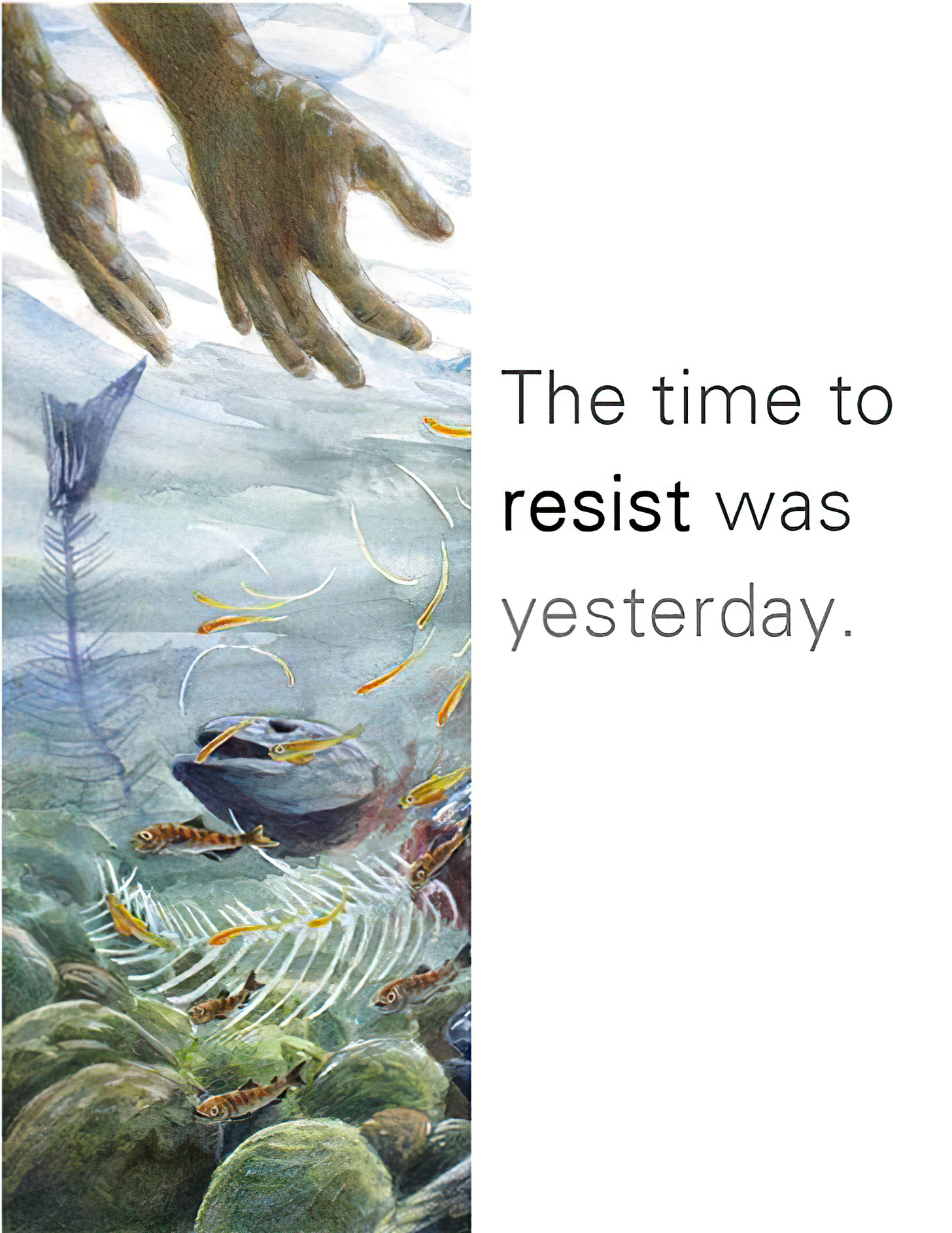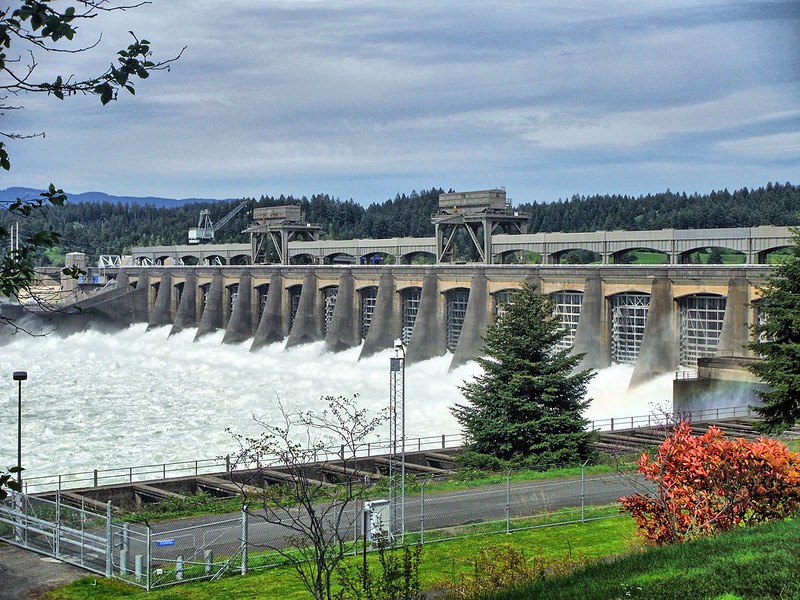In the Pacific Northwest, fish cannot coexist with massive electricity demand.
by Max Wilbert
In 1980, the Bonneville Power Administration (BPA) was given a mission to protect and restore salmon and steelhead fish populations in addition to running the dams in the Columbia River Basin (the most dammed watershed in the world) for electricity generation.
There is a fundamental contradiction between the survival of fish and the existence of dams. To believe otherwise is to deceive yourself. As this new investigation shows, BPA has always prioritized electricity over fish.
Here in the Pacific Northwest, hydroelectric dams produce the vast majority of electricity. And they cannot be replaced with other energy sources quickly, because building new power plants, solar and wind energy facilities, transmission lines, etc. on a large scale takes decades. (And because people like me will fight to defend every scrap of wild habitat from these projects.)
“Just downriver, the half-mile-wide Bonneville dam chokes the Columbia to a halt. When the dam was built in 1937, Bonneville was the biggest dam in the world. Now, it’s one of the smallest of 14 major dams just on the main stem of the Columbia, and one of more than 500 dams in the watershed.”
— Bright Green Lies: How the Environmental Movement Lost Its Way and What We Can Do About It
NB: Offshore wind is coming to Oregon and Washington, and it will be a disaster for seabirds [many of whose populations are already plummeting], fish, whales, other marine mammals, plankton, and our oceans. We who love the natural world must fight this.
This means that we have a choice, here in the PNW. Abundant electricity or fish. We can’t have both.
If we choose fish, that means we must get rid of the dams, which means we must reduce energy demand, and change many other things.
To me that is an easy choice.
This is not a new problem. Advocates for wild salmon and steelhead — those who truly stand with the fish — have been saying this for many years.
Either the dams go, or the fish go.
Max Wilbert is an organizer, writer, photographer, and wilderness guide. He is the co-author of Bright Green Lies: How The Environmental Movement Lost Its Way and What We Can Do About It, which was released in 2021, the co-founder of Protect Thacker Pass, and is a longtime organizer with Deep Green Resistance.

Art by Liana Buzcka
In What Image?In what image have habitats been destroyed?Small patch of woods in suburban landscapechopped down for baseball fields and deck hockey rinks.Destroying creation for recreation.In what image? Baseball, hot dogs, apple pies and Chevrolets?“Image” is an “artificial representation that looks likea person or thing, copy, imitation, phantom.”In what image have habitats been destroyed?In God’s image?As in “Then God said,‘Let us make man in our image, after our likeness.And let them have dominion over the fish of the seaand over the birds of the heavensand over the livestock and over all the earthand over every creeping thing that creeps on the earth.’”Is this the blueprint for overpopulation, franchising and global corporations?“And God said to them, ‘Be fruitful and multiplyand fill the earth and subdue it, and have dominion over…’”“…over every living thing that moves on the earth”Is that the modus operandi for 24-7 surveillance?Full spectrum dominance?What’s wrong with the Winter imageof a snow-capped mountainreflected in a crystal clear lake?What’s wrong with an August lakewith the image of a forest reflectedupside down in still waters?What’s wrong with the imageof a canoe gliding with fish and a clean riverin a gentle rainunder the stars?What’s wrong with the imageof cloudy skyreflectedin a dewdropon a flower?If that’s not “God” then i’m an atheist.What’s wrong with this picture:a text with a photo of a sacred site,oblivious that the site is slated forthe chopping block.What’s wrong with this picture:smiley family picnicyet the trash they’ll leaveisn’t in the photo.We don’t need to go to schoolto learn how touse our imaginations to make stuff up.We need to look at what’s actually happeningand change what images we choose to copy.STOP the choice of images of “sleek” “slick”“sporty” “state of the art” “progress”“because they’re doing it”that destroy this fruitful world.Let the Earthbreathebackbetterand show us the way to livewith all the dizzying multitudinous array of natural images—enough with the religio-corporate dominion over others.


All the ads by Northwest Riverpartners just angers me since we could reduce electricity usage and thus need fewer dams. But even then, we would still need some dams or coal power plants, so collapse is the only way out.
Choices like this are both the root of all environmental & ecological problems (i.e., humans have made the wrong choices), and the way to fix them (i.e., making the right choices). When humans chose agriculture over hunting & gathering, that was the fundamental wrong choice. It would likely take thousands of years for humans to give up agriculture completely and return to living as hunter-gatherers, but that’s what we should aim for. We could eliminate industrial society in the next 150-200 years, which would mean not only no dam(n)s, but no electricity, no industrial society, and much lower human population; these are all the necessary first steps toward returning to living as hunter-gatherers and return to living in proper balance with the Earth and its ecosystems, and with all the other life here.
150-200 years is far too slow of a timeframe to expect the end of industry. If we don’t destroy industrial society. The wrath of nature will still see it through. The question is what will be left when industrial society does collapse.
Jeff, for the last time: WE DON’T HAVE 150-200 YEARS! Nor does it look like we’ll even have the luxury of making that decision.
As climate change seems to make more certain by the day, our lifestyle of “More!” virtually assures the collapse of civilization within 20 years. That should trigger the death of 3-4 billion people (by starvation, civil wars, and border wars), and will make revolutionary change obligatory, for anyone hoping to survive.
People don’t seem to realize how close we are already. The U.N. says all that the collapse of civilization would require is simultaneous crop failures in five or siz of the top ten grain producers — which war in Ukraine, and the ever-worsening global droughts could almost make a reality this year. (Crop failures in Russia and Ukraine are a virtual certainty for 2022, and will not be averted by much in China, India, France, and Australia — which, together, account for six of the top ten.)
Excellent article!
Mankh’s poetry as a coda is very appropriate.
Excellent article, well-written and pointed analysis.
The choice of Mankh’s meaningful poetry fits very well with the article.
Please don’t hate on me…I am honestly asking this question because I want to understand and it is the solution being brought forth as to why we can have both.
Why will things like fish passageways on the sides of dams not work? Passageways on the side of dams, or small rivers built that meander from the top of the damn to the bottom over several acres to the side of a dam in which fish can easily swim around the dam?
In my area, we are led to believe it is not a dam or fish question, both can co-exist. So….looking for reasons this can’t be so.
Dams of course cause other problems of course, but right now, looking into the reasoning of why fish and dams can’t co-exist if structures are built that let them bypass the dam.
Of course we won’t hate you, Sharon, that’s a reasonable question. Fish passage like you speak of is far better than nothing, but it doesn’t mitigate most of the harm caused by dams. For example:
1. Although dams do present a barrier to adult fish traveling upstream to reproduce, the biggest harm to fish caused by dams is actually the death of smolt (young ones) migrating downstream, passing through (or getting sucked into) hydroelectric turbines, and being killed. Fish passage may provide a path for some smolt, but most don’t use it — it’s a fundamentally unnatural river system — and it doesn’t solve the issue. As one article says: “Biologists estimate that if turbine passage is the only way past a dam, 10 to 15 percent of the fish that are drawn through the turbines will die. With that much mortality at least possible at each dam, fish that pass multiple dams, such as fish from central Washington or the Snake River, have a statistically high probability of dying before they pass the last dam, Bonneville.”
2. Another big issue is water temperatures. Reservoirs that form behind dams are stagnant and create unnatural water temperatures (much hotter than the river’s natural temperatures in temperate regions, and much sometimes much colder than natural temperatures in warmer areas of the planet when water released through hydroelectric turbines is sucked in from the bottom of the reservoir). This leads to flourishing of invasive species, greater competition with native fish, disease, and more.
3. In addition, the slack water of these reservoirs is very unnatural and difficult for native anadromous fish to navigate, especially (once again) for the young fish trying to return to the ocean. This slows them down and exposes them to predators.
4. Another big issue is related to sediment. Dams change the flow and hydrology of rivers by trapping sediment in the water behind the dam and changing natural cycles of flooding. This ultimately hurts native fish who depend on naturally-created habitat like gravel streambeds, deep pools, log jams, etc. for spawning (reproduction), protection from predators, feeding, and growing up. In the Columbia River basin, for example roughly 30-50% of all habitat is now deep underwater due to reservoirs (or blocked completely by dams with no fish passage).
5. Dams and reservoirs change the natural condition of the river and significantly change the food that is available.